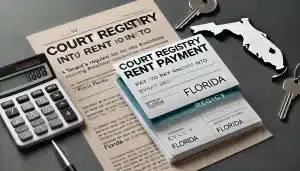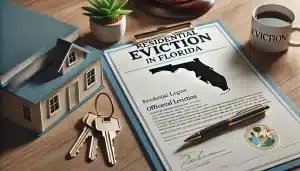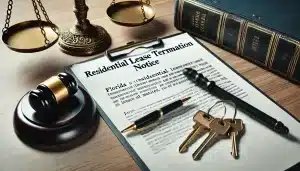Table of Contents
Navigating Florida’s Eviction Process: A Comprehensive Guide for Landlords and Tenants
Introduction
The eviction process in Florida is designed to protect both landlord and tenant rights while ensuring disputes regarding rental agreements are resolved fairly and efficiently. One of the most common scenarios prompting eviction involves the nonpayment of rent. Understanding the eviction procedures, including the tenant’s critical obligation to deposit rent payments into the court registry during litigation, is crucial for both parties. Failure to fully understand or comply with these laws can significantly affect the outcome of eviction cases.
Legal Grounds for Eviction in Florida
Before initiating an eviction, Florida landlords must clearly establish valid legal grounds. Florida law outlines specific circumstances under which eviction can occur:
Nonpayment of Rent
The most common reason landlords pursue eviction is for nonpayment of rent. Florida statutes require that a landlord provide the tenant with a clear, written three-day notice (excluding weekends and legal holidays) demanding the owed rent or requiring that the tenant vacate the premises.
Lease Violations
When tenants violate terms explicitly defined in the lease agreement, landlords can issue a seven-day notice, allowing tenants to correct (or “cure”) the violation or vacate the property.
Property Damage
Significant and intentional damage to the rental property by the tenant or their guests constitutes valid grounds for eviction. Landlords may pursue immediate eviction, especially in cases involving substantial or continuous property damage.
Illegal Activities
If tenants engage in illegal activities on a rental property, including drug-related offenses or other criminal acts, Florida law provides landlords with legal mechanisms to evict the tenant rapidly.
Holdover Tenancy
When a tenant remains on the property after their lease has ended without the landlord’s consent, it creates a “holdover” tenancy. Landlords may begin eviction procedures to reclaim their property.
Step-by-Step Eviction Process
Understanding each step in the eviction process helps both landlords and tenants navigate the legal system effectively. Emphasis on the tenant’s requirement to deposit rent into the court registry is critical and is detailed thoroughly in the following process:
Serving the Appropriate Notice
Landlords must first serve a formal eviction notice. The notice period for nonpayment of rent is three business days. The notice should clearly state the overdue rent amount, due date, and landlord’s intention to evict if the rent remains unpaid.
Filing an Eviction Complaint
If the tenant fails to respond or resolve the issue within the notice period, landlords must file an eviction complaint with their local county court. This complaint formally initiates legal proceedings and officially places the tenant under the court’s jurisdiction.
Serving the Summons to the Tenant
The tenant must be served with an official eviction summons, notifying them of the legal action and instructing them on how to respond. The summons includes information on the mandatory obligation for tenants to deposit disputed rent into the court registry.
Tenant’s Response
Upon receiving an eviction summons, tenants have five business days to file their response with the court. This response may include raising valid defenses to the eviction, such as disputes about the amount owed, improper notice, or retaliatory eviction.
Paying Rent into the Court Registry
Florida Statute §83.60(2) specifically mandates that if a tenant contests eviction based on any defense other than payment, the tenant must deposit the full amount of rent due (as claimed in the landlord’s complaint or as determined by the court) into the court registry. Also, tenants must continue depositing rent payments into the court registry during eviction litigation. Failure to comply within the stipulated time frame results in tenants losing their ability to defend against eviction. This requirement is pivotal, ensuring landlords are financially protected during litigation.
Court Proceedings
If tenants comply with depositing rent, the court schedules an eviction hearing. Both landlord and tenant present their evidence and testimony. The judge evaluates the case based on documentation, proof of rent payments or nonpayments, and any other pertinent facts presented during the hearing.
Judgment and Execution
If the court rules in the landlord’s favor, it issues a judgment and a writ of possession, instructing the sheriff to remove the tenant from the premises, allowing the landlord to regain possession.
Understanding this process — especially the crucial requirement for tenants to deposit rent into the court registry — ensures fairness and clarity, providing reassurance to both landlords and tenants in properly managing disputes related to residential rental agreements in Florida.
Tenant’s Obligation to Pay Rent into the Court Registry
One of the most distinctive and critical aspects of eviction proceedings in Florida is the statutory requirement that tenants deposit rent payments into the court registry. This obligation, outlined explicitly in Florida Statute §83.60(2), protects both landlords and tenants during the eviction litigation process.
Understanding Florida Statute §83.60(2)
Florida Statute §83.60(2) mandates that when a tenant raises any defense to an eviction complaint — other than payment — the tenant is required to deposit the rent in question into the court registry. This law ensures landlords continue receiving due rent payments, even amidst a dispute, and provides a secure legal framework for tenants to prevent unjust eviction while the matter is litigated.
This statute further outlines that tenants must continue depositing rent as it becomes due throughout the eviction proceedings. Failure to follow this mandate results in forfeiting the tenant’s defenses and allows the landlord to swiftly move toward an immediate judgment for eviction without additional hearings or notices.
Procedure for Depositing Rent into Court Registry
Once the eviction complaint is served, the tenant has five business days to deposit the alleged outstanding rent amount with the court registry. Should the tenant disagree with the rent amount claimed by the landlord, they must promptly file a Motion to Determine rent.
This motion triggers a hearing where the court evaluates evidence from both sides to determine the appropriate rental amount. Tenants must provide documentation supporting their claimed amount, such as receipts, bank records, canceled checks, or proof of payment. Only after a judge makes a determination does the tenant then deposit the ordered amount into the registry.
Consequences of Noncompliance
Failure by the tenant to deposit the required rent amount within five business days or to file the Motion to Determine rent effectively waives their right to defend against the eviction on any grounds other than the payment itself. This underscores the urgency of compliance and the potential acceleration of the eviction process.
Common Defenses Tenants May Raise
Understanding common tenant defenses is crucial for landlords aiming for smooth and legally sound eviction proceedings.
Improper Notice Defense
One of the most frequent defenses tenants use is improper eviction notice delivery. Florida statutes specify exact notice formats, timelines, and delivery methods that landlords must strictly follow. Errors, even minor ones, can invalidate eviction notices, forcing landlords to start over.
Retaliatory Eviction Defense
Florida law explicitly protects tenants from retaliatory evictions. If a tenant has reported legitimate health, safety, or building code violations, the landlord cannot lawfully retaliate by attempting eviction. Courts scrutinize eviction motives carefully, and retaliatory actions can result in penalties against landlords.
Discrimination Claims Defense
Federal and Florida state laws prohibit discrimination against tenants based on protected characteristics, including race, religion, nationality, gender, familial status, and disability. Evictions motivated by discriminatory reasons are unlawful, exposing landlords to significant legal liabilities.
Habitability Issues Defense
Tenants may defend against eviction claims for nonpayment by citing habitability issues. Florida requires landlords to maintain livable conditions — adequate plumbing, structural safety, heating, cooling, and sanitation. If tenants provide written notice regarding maintenance failures and landlords fail to remedy issues within seven days, tenants may legally withhold rent payments.
Best Practices for Landlords
Landlords navigating evictions for nonpayment should adhere to strategic best practices to minimize risk, streamline the process, and enhance their chances of a successful eviction.
Maintain Accurate Records
It is essential to keep precise financial records and detailed documentation of all tenant interactions, notices served, repairs conducted, and rent payments received. This meticulous documentation becomes critical evidence if the eviction escalates to a court hearing.
Comply Strictly with Florida Law
Florida statutes governing evictions can be intricate, particularly regarding notices and timelines. Landlords must precisely adhere to procedures for eviction notices, complaint filings, and rent collection. Noncompliance, even unintentional, can result in costly delays or dismissal of the eviction case entirely.
Effective Tenant Communication
Clear communication and prompt responses help landlords avoid unnecessary disputes. Promptly addressing tenant inquiries and clearly articulating the terms outlined in the lease and eviction notices can often prevent unnecessary conflict or misunderstandings.
Seek Legal Advice Promptly
Given the complexity of Florida eviction laws, early consultation with a qualified attorney can help landlords navigate the legal landscape efficiently. Timely legal advice can expedite the eviction process, prevent costly errors, and ensure compliance with all procedural requirements.
Best Practices for Tenants
To ensure fairness and potentially mitigate negative consequences during eviction disputes, tenants should also know certain best practices.
Understand Your Lease Agreement Thoroughly
Tenants must familiarize themselves with their lease terms, particularly the stipulations regarding rent payments, late fees, and grounds for eviction. Knowing one’s rights and responsibilities is foundational to preventing eviction scenarios.
Respond Promptly and Proactively
Responding promptly to notices and demands is critical if faced with eviction. Taking immediate action—whether paying owed rent, negotiating with the landlord, or seeking legal assistance—can prevent a full eviction proceeding from occurring.
Document All Communications and Issues
Maintaining clear, organized records of communications with the landlord, notices received, and any maintenance requests submitted can prove vital in defending against eviction or demonstrating compliance with lease terms.
Engage Professional Legal Assistance
Legal representation provides tenants with knowledgeable advocacy and strategic guidance, especially in contentious eviction cases. Experienced attorneys like John M. Jorgensen of Scott, Harris, Bryan, Barra & Jorgensen, P.A. can help tenants effectively present defenses, secure fair hearings, and explore beneficial alternatives such as negotiated settlements, repayment plans, or mediation.
Navigating the eviction process alone can put your rights at risk — request a consultation today with John M. Jorgensen at our Palm Beach Gardens office to ensure your rights are fully protected.
Best Practices for Tenants Facing Eviction
Thoroughly Understand Your Lease Agreement
One of the most effective ways for tenants to protect themselves from eviction in Florida is by thoroughly understanding their lease agreements. Knowledge of terms related to rent payment deadlines, grace periods, and penalties can help avoid disputes that escalate into eviction proceedings.
Act Promptly Upon Receiving Notice
If you receive an eviction notice, it’s crucial to act promptly. Ignoring or delaying action limits your options and may result in default judgment and eviction. In Florida, tenants have only five business days to respond or deposit rent into the court registry to maintain their right to defend against eviction claims.
Maintain Detailed Documentation
Keeping detailed documentation is essential when disputes arise. This includes copies of rent receipts, bank transactions, correspondence with your landlord, photographs of property conditions, and any maintenance requests. Documentation helps significantly when presenting your defense in court.
Consult Attorney John M. Jorgensen for Expert Guidance
Tenant-landlord disputes, particularly eviction cases, can be legally intricate and challenging. Experienced attorneys, such as John M. Jorgensen at Scott, Harris, Bryan, Barra & Jorgensen, P.A., have deep knowledge of Florida’s landlord-tenant laws and can provide valuable guidance throughout the eviction process. Consulting with legal counsel early ensures your rights remain protected and can open the door to effective negotiations, mediated agreements, or alternative resolutions that may prevent eviction altogether.
Request a consultation with John M. Jorgensen at our Palm Beach Gardens office today to get the professional legal support you need.
Frequently Asked Questions (FAQs)
Q: How long does the eviction process take in Florida?
A: Generally, the Florida eviction process takes approximately three to six weeks, though the timeframe can vary based on court schedules, tenant defenses, and compliance with legal procedures.
Q: Can a landlord evict a tenant without going to court?
No. Florida law strictly prohibits self-help eviction practices, such as changing locks, shutting off utilities, or forcibly removing tenants. All residential evictions must proceed through the legal court process.
Q: What happens if a tenant pays rent after receiving an eviction notice?
Paying rent after receiving a three-day eviction notice generally cures the default if payment is made within the notice period. However, landlords are not obligated to accept rent payments after this period unless a new agreement is reached or the court orders otherwise.
Q: Are there alternatives to eviction proceedings?
Yes. Alternatives include mediation, creating repayment plans, or mutual termination agreements. These can benefit landlords and tenants alike, reducing stress and costs and preserving landlord-tenant relationships.
Q: How does an eviction impact a tenant’s credit report?
Eviction judgments appear on public records and can be reported by credit bureaus, negatively impacting a tenant’s credit score and future rental opportunities. Therefore, resolving disputes before they reach judgment is beneficial.
Conclusion
Navigating residential eviction proceedings for nonpayment in Florida requires careful adherence to state statutes, especially regarding the tenant’s obligation to deposit disputed rent into the court registry. Both landlords and tenants must thoroughly understand their respective rights, responsibilities, and options throughout this process.
Evictions are legally complex and emotionally charged events, but understanding and following proper procedures can help both parties reach fair outcomes efficiently. Landlords can minimize legal and financial risks by strictly adhering to statutory requirements, while tenants who proactively assert their rights have the best chances of preserving their housing situation.
Landlords or tenants facing eviction issues in Palm Beach County — including Palm Beach Gardens, West Palm Beach, Jupiter Farms, North Palm Beach, Singer Island, Loxahatchee, and Tequesta — should seek legal guidance.
Experienced Legal Support for Evictions in Florida
When dealing with eviction proceedings or landlord-tenant disputes in Florida, you need expert guidance to navigate complex legal requirements successfully. Attorney John M. Jorgensen of Scott, Harris, Bryan, Barra & Jorgensen, P.A. brings decades of experience handling residential eviction cases, ensuring your rights and interests are vigorously represented. Whether you’re a landlord seeking swift resolution or a tenant looking to protect your rights, John Jorgensen provides the clear, strategic advice you need.
Contact our Palm Beach Gardens office today to schedule a personalized consultation with John M. Jorgensen and protect your interests effectively.
Resource Links for Further Reading:
- Florida Statutes Chapter 83 – Landlord and Tenant
- Palm Beach County Clerk of Court – Evictions
- Florida Bar Guide to Landlord-Tenant Law
- Florida Courts – Residential Eviction Procedures
To schedule your consultation with attorney John M. Jorgensen, call our Palm Beach Gardens office at (561) 624-3900 or conveniently request an appointment by completing our online contact form. We look forward to assisting you with your landlord-tenant matters promptly and professionally.












